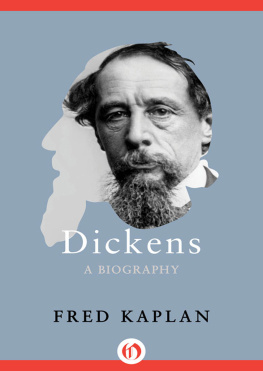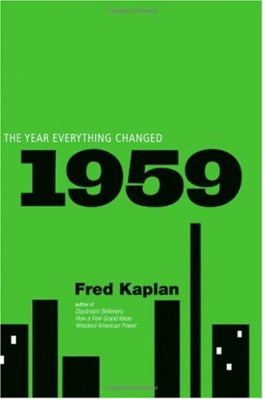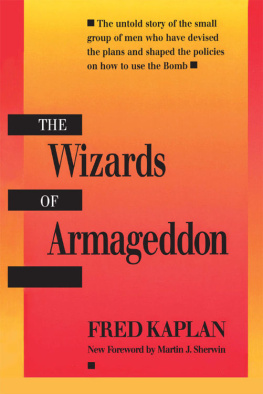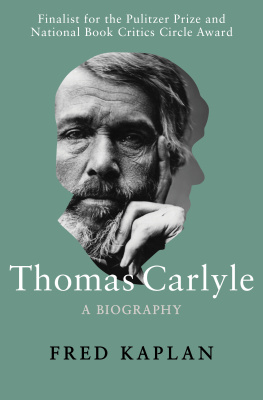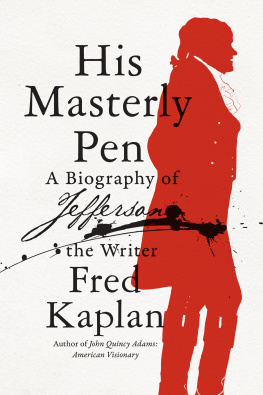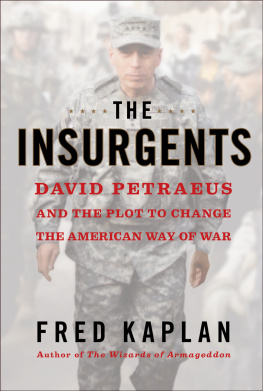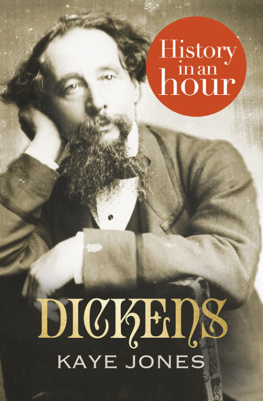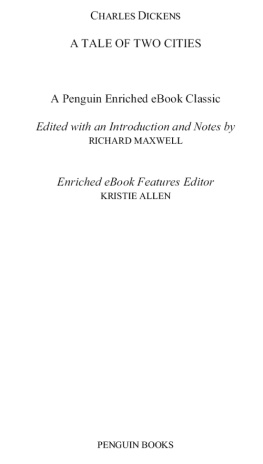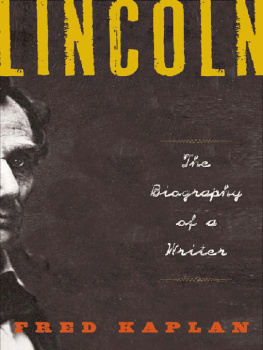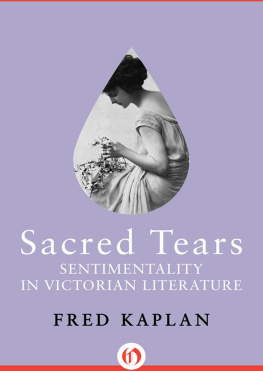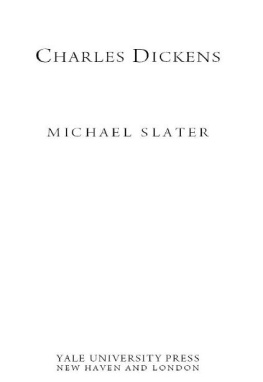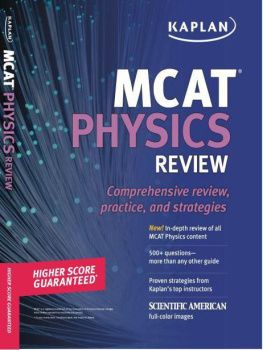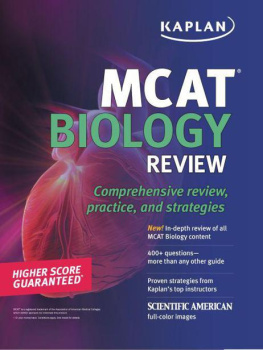Dickens
A Biography
Fred Kaplan

To Julia, Noah, and Ben, and to the memory of my father
Contents
Acknowledgments
D URING THE YEARS THAT I HAVE WORKED ON THIS BOOK I HAVE incurred many professional and personal obligations, all of which, in their various permutations, have contributed to its creation. The primary institutional obligations are to libraries and universities, and to two research centers, the Huntington Library and the National Humanities Center, which provided me with substantial fellowships. The National Endowment for the Humanities also gave financial assistance. My own college and university, Queens College (which generously granted me a Presidential Research Award and Faculty Research awards) and the Graduate Center of the City University of New York, kindly contributed to my having had time to work on this long but mostly happy labor.
Three libraries and their beneficent overseers head the list of my archival obligations: the Berg Collection of the New York Public Library and its curator, Lola Szladits, the Dickens House Museum in London and its curator, David Parker (who kindly read and made helpful comments on the manuscript), and the Henry E. Huntington Library in San Marino, California, and its librarian, Daniel Woodward. At the Dickens House Museum, I was also helped by Eileen Power, and at the Huntington Library by Mary Robertson, Susan Hodson, Alan Jutzi, and Martin Ridge. Other libraries and librarians whose resources and generosity I am thankful for are the Beinecke Rare Book and Manuscript Library, Yale University (Marjorie Wynn), the British Library, the Harry Ransom Humanities Research Center of the University of Texas (Cathy Henderson), the National Library of Scotland, the Pierpont Morgan Library, the Benoliel Collection of the Free Library of Philadelphia (Walter A. Frankel), the Parrish Collection of Princeton University Library (Jean F. Preston and Alexander D. Wainwright), the Sadleir Collection of the University of California at Los Angeles, and the Forster Collection of the Victoria and Albert Museum. These and other such obligations are further detailed in the citations of sources.
The Editors and Trustees of the Pilgrim Edition of The Letters of Charles Dickens, to whom Mr. Christopher Dickens has turned over the common-law copyright for Dickens unpublished letters, have kindly permitted the use of summaries and brief quotations. I am especially indebted to Kathleen Tillotson for her support and cooperation. Graham Storey has kindly conveyed to me this permission on behalf of Christopher Dickens. I am also indebted to R. A. Denniston, the publisher of the Oxford University Press for permission to quote from the published letters.
Personal and professional debts begin to become indistinguishable, probably inseparable, at this point, though one has an institutional presence that allows me to acknowledge here how stimulating and helpful have been my years of participation in the Dickens Project of the University of California at Santa Cruz, and the support of its two directors, Murray Baumgarten and John Jordan, and of Edwin Eigner and my other colleagues there.
My friend and colleague David Kleinbard has contributed to some of the small moments of grace that the book may have by his kind, helpful reading of the manuscript. Rhoda Weyr, who has been the first audience for some of this book, has my warm appreciation for her help. My colleagues at the seminar in biography at New York University made useful suggestions, particularly in regard to the first chapter, and Im especially indebted to Robert Halsband, Charles Molesworth, and Aileen Ward for their comments. My colleague at the National Humanities Center, Donald Scott, provided me with a helpful Dickens document from the Newton Antiquarian Society archives. Kirk Beetz kindly shared with me some of his wide knowledge of Wilkie Collins letters. I owe a debt of appreciation to Kathleen Longley, who allowed me to read and benefit from her unpublished writings on Ellen Ternan and the Ternan family. Jay Williams provided kind words and suggestions throughout.
Georges Borchardt in New York and Richard Simon in London are partly responsible for the excellent editing and production that the book has had under the capable and creative eye of Maria Guarnaschelli of William Morrow and the thoughtful suggestions that were made by John Curtis of Hodder & Stoughton. Amy Edelman of William Morrow has copyedited the manuscript with great competence and intelligence, and she and her colleagues Cheryl Asherman, Susan Halligan, and Dennis Combs have been invaluable. Sylvere Monod, during my stay in Paris, was kind enough, among his many kindnesses, to direct me to Olivier Cohen of Mazarin. Michelle Lepautre graciously brought us together. To Sylvere Monod I also am indebted for introducing me to Janine Watrin, who generously spent a day showing me all the Dickens sites and associations in the area of Condette and Boulogne. Dr. Kenneth Churchill, the cultural attach at the British Embassy in Paris, put me in touch with his colleague Diana Neill, who graciously took me on a tour of the embassy to indulge my desire to examine the ballroom in which Dickens had given readings. Gloria Kaplan helpfully shared ideas and rendered assistance.
I am indebted, in alphabetical order, to the following people for acts of assistance that directly or indirectly contributed to my work: Laura Maslow Armand, Jerome Badanes, Maggie Blades, Doreen Blake, Charles Blitzer, Martin Blum, Philip Bolton, Charles Carlton, Philip Collins, Sandra Copeland, Mara Lemanis Cunningham, Enid Davey, Wally Davey, Morris Dickstein, Daniel Donno, Elizabeth Donno, Nan Dorsey, Robert Edwards, K. J. Fielding, Ernestine Friedl, Norman Fruman, Regenia Gagnier, Edward Geffner, Elliot Gilbert, Michael Goldberg, Harold Goldwhite, Maria Goldwhite, Mark Greenberg, Robert Greenberg, Vivian Greenberg, Edward Guiliano, Jack Hall, Katie Higby, Robert Higby, Theo Hoppen, Jean Houston, Irving Howe, Lois Hughson, Howard Hughson, Al Hutter, Gerhardt Joseph, Alfred Kazin, Shirley Strum Kenny, Maureen Kleinbard, Uli Knoepflmacher, Barbara Leavy, Peter Leavy, Jean Leuchtenberg, Townshend Luddington, Carol Mackay, Harold Marcus, Steven Marcus, Annie Monod, Linda Morgan, Kent Mulliken, Robert Patten, Gordon Philo, Robert Polehumus, Wayne Pond, Norris Pope, John Reilly, Virginia Renner, James Riddell, Murray Roston, Clyde Ryals, Andrew Sanders, Hilary Schor, Pat Schrieber, Elsa Sink, Michael Slater, Doris Smedes, Harry Stone, James Thorpe, Charles Tolk, Robert Tracy, Allan Tuttle, Rebecca Vargha, Roland Voize, Alexander Welsh, the late Elizabeth Wheeler, and Carl Woodring.
Finally, a Dickensian acknowledgment of a philosophical sort, my expression of appreciation to that long list of people who have been helpful and kind to me. It has not been more than I deserve, to paraphrase and reverse Coleridges sad comment. But it is a marvel to be savored and appreciatedhow many people, despite the problems of life and time, generously help those who ask.
Notes
ABBREVIATIONS
The following abbreviations and short titles are used in the notes:
MANUSCRIPTS
Berg Henry W. and Albert A. Berg Collection, the New York Public Library, Astor, Lenox and Tilden Foundations

